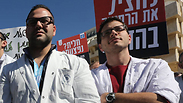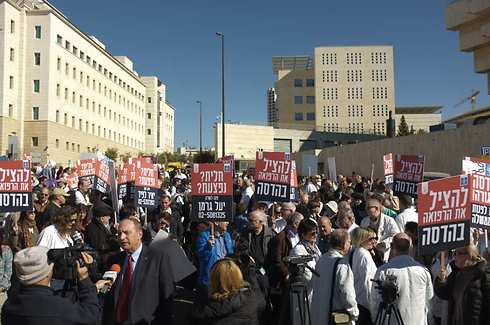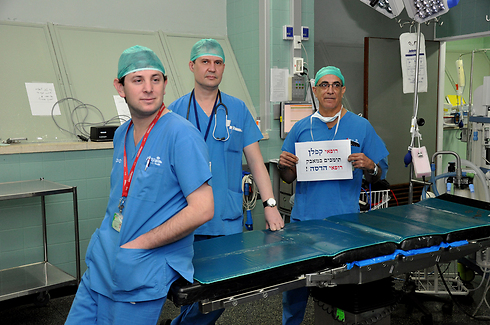
Israeli doctors halt work in a show of solidarity with embattled Hadassah staff
Across the country, hospitals dialed back activities as Jerusalem area hospitals protest abysmal pay, poor conditions
Doctors at hospitals across the country halted their work for two hours in a show of solidarity with their colleagues at the Hadassah medical centers in Jerusalem, as Hadassah management had asked for an adjournment in the organization's labor dispute over the weekend.
Several hundred Hadassah workers also protested in front of the Prime Minister's Office, where the cabinet meeting was taking place. The demonstrators were protesting the conduct of the government and Hadassah's management during the crisis.
During the brief strike, the hospitals operated according to Shabbat procedures, accepting only urgent care patients.
Dr. Shay Porat, the senior physician in the obstetrics and gynecology department at the Mt. Scopus campus, said during the demonstration: "The government is trying to bring us to our knees. There was a failure in management but Hadassah is not a supermarket; it's a big hospital which serves the entire population of Jerusalem."
He added: "In the last months there were errors in transferring the paychecks to us, we only got half our salary last months, and they say we won't get our salary next month. There are heads of family here that are forced to take money from their parents."
Chair of the senior doctors' union, Dr. Sagit Arbel-Alon, said at the protest: "I came here to apologize to the residents of Jerusalem and to our patients from across the land. I ask forgiveness on behalf of Minister Yael German, who did not find the time to meet with the doctors even once during all these months."
Arbel-Alon continued with an attack on the administration: "What kind of health minister disparages even the best of us and makes us all seem money-hungry? I also ask forgiveness on behalf of the Finance Ministry that has done everything in its power to push the hospital into decline, and in the name of the Israeli government which has – to this day – not built even one hospital in Jerusalem."
She emphasized: "All four hospitals here were built by philanthropists."
The chairman of the Israel Medical Association, Dr. Leonid Eidelman, also attended the demonstration. He said: "We absolutely reject the attempt to present the doctors as those responsible for the current predicament. The doctors did not steal money from Hadassah, quite the opposite."
He added, "The prime minister should get involved. He cannot stand at a distance and watch as Hadassah crumbles. Only he can give the order to end this crisis. The doctors are willing to reach out and enter intensive negotiations."
Because of the NIS 300 million ($85 million) current accounts deficit and the overall deficit which totals NIS 1.3 billion ($370 million), the hospital's management asked the district court to freeze all proceedings against it. The move was criticized by doctors, nurses, and other employees who worried that a freeze would allow the hospital to ignore the collective agreements and take unilateral measures.
The details of the request show a management bordering on anarchic and characterized by loose work directives and numerous budgetary clauses which easily explain the decline of the medical center.
Some shocking examples: private procedures operated during public intake hours, dozens of millions of shekels for additional hours and standby hours which are superfluous and 900 management salaries in an institution with only 400 designated positions.
Dr. Uriel Tratemberg complained about what he defined as disappointing publicity: "We, the young doctors and specialists, do not work with Sharap (private medical service). We receive a salary like every government employee. Specialists like me, after eight years of study, with a master's degree or more, and years of losing out on pensions and other rights, earn about NIS 12,000 ($3,400) per month, when we work 5.5 days a week and seven days a month of being on call for 24 hours."
The hospitals' employees are protesting a lengthy negotiation between the Finance Ministry and Hadassah, and the treasury's demand that many employees be fired and the benefits of those who remain be minimized.
Aviel Magnezi and Yaron Kelner contributed to this report












